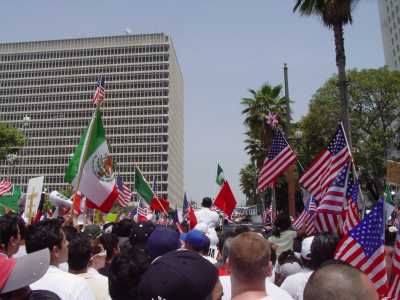From news stories about unaccompanied minors from Central America to invisible workers without legal standing, immigration continues to stir debate in the United States. The arguments framing the issue are often inflected with distorted ideas and words. We sat down with Hiroshi Motomura, the author of Immigration Outside the Law, to discuss this contentious topic.
You use the term “unauthorized migrants” instead of “illegal” or “undocumented” immigrants. Why this choice of words?
This is a topic that is so controversial that even the labels provoke deep disagreement. The words “illegal” or “undocumented” often reflect very strong views. Because my goal is to explain what makes these debates so heated and then to analyze the issues carefully, I start with neutral terms, like “unauthorized” and “immigration outside the law.” I reach some firm conclusions about the nature of unauthorized migration and the best policy responses, but I try hard to work through the many arguments on both sides, acknowledging my own assumptions and taking all views seriously. This effort requires that I start with neutral terms.
What was the influence of the landmark 1982 US Supreme Court decision in Plyler v. Doe on our current discussion of immigration policy?
Plyler was pivotal. The Court said that the state of Texas couldn’t keep kids out of public schools just because they are in the United States unlawfully. It was a 5–4 decision, and we can debate whether the Court would come out the same way today. But Plyler it is much more than constitutional law. Plyler turned on three questions that remain at the heart of controversy. First, what does it mean to be in the United States lawfully––is “illegal” or “undocumented” more apt? Second, what is the state and local role in immigration policy? Third, should unauthorized migrants be integrated into US society—are they “Americans in waiting”?

A photograph of the May 1st, “Day without an Immigrant” demonstration in Los Angeles, California. © elizparodi via iStockphoto.
Are unauthorized migrants “Americans in waiting”?
Many unauthorized migrants are Americans in waiting, meaning that their integration into American society should be recognized and fostered. Unauthorized migrants have contributed to US society, especially through work, often over a long period of time. Their contributions justify lawful immigration status and a path to citizenship. An argument that is just as strong, though less often heard, is that unauthorized migrants have come to the United States as part of an economic system that depends on them — to be tolerated when we need them and exposed to discretionary enforcement when we don’t. These two arguments aren’t mutually exclusive, and both find support in history and the reality of today’s America.
Can unauthorized migrants currently assert their rights within the US legal system?
Unauthorized migrants can assert rights in many settings. They can sue if an employer refuses to pay them. They have a right to due process in the courts. In many states, unauthorized residents are eligible for driver’s licenses and in-state tuition rates at public colleges and universities. They are not relegated to oblivion. Why not? These rights recognize in small ways that unauthorized migrants are Americans in waiting. To be sure, broad scale legalization proposals in Congress attract a lot of attention, but mini-legalizations take place every day in settings where decision-makers at all levels of government acknowledge the place of unauthorized migrants in American society.
What have state and local governments done to address immigration outside the law?
The state government authority was at the heart of Plyler, and the state and local role has been controversial ever since. States and localities have tried to enforce federal immigration laws directly or indirectly. Arizona’s SB 1070 is a prominent example. At the same time, other states and localities try to integrate unauthorized migrants, through driver’s licenses, ID cards, and access to higher education, and by curtailing cooperation with federal immigration enforcement. Does federal immigration authority displace both types of state or local laws? I think not. The compelling reason to limit state and local enforcement is preventative––so state and local officials can’t enforce immigration laws in ways that are selective and discriminatory. This concern doesn’t apply when states and localities recognize or foster the integration of unauthorized migrants.
A version of this article will appear in the UCLA School of Law alumni magazine.
Hiroshi Motomura is Susan Westerberg Prager Professor of Law at UCLA. He is the author of Immigration Outside the Law and Americans in Waiting.
Subscribe to the OUPblog via email or RSS.
Subscribe to only law articles on the OUPblog via email or RSS.
The post On unauthorized migrants and immigration outside the law appeared first on OUPblog.


